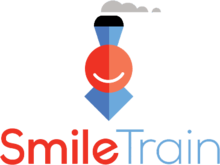Smile Train
 | |
| Formation | 1999 |
|---|---|
| Type | 501(c)(3) nonprofit |
| Headquarters | New York City, New York, United States |
| Susannah Schaefer | |
| Website | www.smiletrain.org |
Smile Train is a nonprofit organization and charity providing corrective surgery for children with cleft lips and palates.[1] Headquartered in New York City and founded in 1999, Smile Train provides free corrective cleft surgery in 87 countries,[2] training local doctors and providing hospital funding for the procedures.[2]
History
Smile Train was created in 1998 by Brian Mullaney and Charles Wang, who had previously worked with Operation Smile, another charity focused on correcting cleft lips and palates.[3] They felt the most efficient way to provide cleft surgery was to train and support local doctors rather than to fly in Western doctors to provide surgeries in poor, developing countries.[3][4] Local doctors would also be able to provide care year-round rather than the limited engagements of the "mission-based" model.[3][4] In 1999, Smile Train approached Dr. Court B. Cutting of New York University's Virtual Research Laboratory to create training videos, which could be used to train local doctors on how to perform advanced cleft surgery techniques.[5] The 3D models used in the videos were based on the CT scan of two Chinese patients.[6] Smile Train distributes the DVDs to local doctors worldwide.[4][5] The DVDs are available in English, Spanish, and Mandarin.[7]
In 1999, Smile Train began providing corrective surgeries in China.[2] The charity worked with the then-American and Chinese presidents, George H. W. Bush and Jiang Zemin, in the planning of Smile Train's first operation in China.[8][citation needed]
Smile Train began working in India in 2000.[9] In 2011, Aishwarya Rai, a Bollywood actress and former Miss World, became Smile Train's first goodwill ambassador.[10] In 2006, Smile Train co-founded the Pan African Congress on Cleft Lip and Palate. The charity also funded the 2008 Pan African Anaesthesia Symposium.[11]
Recognition
In a 2008 New York Times article, economist Steven Levitt of Freakonomics fame indicated that the organization's model and its technological innovations "likely make Smile Train one of the most productive charities, dollar for deed, in the world."[12]
In 2009, the documentary Smile Pinki, which was sponsored by Smile Train and directed by Megan Mylan, won the 2008 Oscar for Best Documentary (Short Subject).[13] The film shows the story of a poor girl in rural India whose life is transformed when she receives free surgery to correct her cleft lip.
They worked with the Scottish charity KidsOR to revamp 30 operating thentres in Africa. This included three in Nigeria like the example in Kano where they have revamped a theatre there in the city's Armed Forces Specialist Hospital in 2022.[14]
Criticism
In 2008, Charity Watch criticized then-president Brian Mullaney's $420,209 salary and questioned the 2007 company's tax form, which said Mullaney's salary came from temporary restricted funds designed to go toward overhead.[15]
In 2009, Givewell could not assess the impact of Smile Train's activities based on the charity's 2008 tax form and other publicly accessible information.[16]
Smile Train Canada's charity status was revoked on July 4, 2015, after six years of operation by Canada's Charities Directorate for failure to allocate donations towards charity purposes, failure to carry out its charity work, failure to file accurate information and other serious deficiencies.[17]
See also
- List of cleft lip and palate organisations
- List of non-governmental organizations in the People's Republic of China
References
- ^ Domenico Nicosia (15 November 2013). "Ironman Arizona athletes raise funds for Smile Train to help kids". AZ Central. Retrieved 6 May 2014.
- ^ a b c Liu Zhihua (24 October 2013). "Driven by smiles". China Daily. Retrieved 6 May 2014.
- ^ a b c Simpson, Elizabeth (17 November 2013). "Two sides of charity: Competing, compassion". The Virginian-Pilot. Retrieved 20 May 2014.
- ^ a b c Dubner, Stephen J.; Levitt, Steven D. (9 March 2008). "Bottom-Line Philanthropy". The New York Times. Retrieved 20 May 2014.
- ^ a b Amanda Schaffer (2 August 2005). "Cleft Palate Practice, Pre-Surgery". The New York Times. Retrieved 20 May 2014.
- ^ Oliker, Aaron; Cutting, Court (2005). "The Role of Computer Graphics in Cleft Lip and Palate Education". Seminars in Plastic Surgery. 19 (4): 286–93. doi:10.1055/s-2005-925901. PMC 2884744.
- ^ Sheppard, L.M (2005). "Virtual surgery brings back smiles". IEEE Computer Graphics and Applications. 25 (1): 6–11. doi:10.1109/MCG.2005.26. PMID 15691163.
- ^ Brown, Nell Porter (September–October 2009). "Scaling Up Charity". Harvard Magazine. Retrieved 20 May 2014.
- ^ Singh, Subodhkumar (2009). "Smile Train: The ascendancy of cleft care in India". Indian Journal of Plastic Surgery. 42 (3): S192–8. doi:10.4103/0970-0358.57186. PMC 2825070. PMID 19884676.
{{cite journal}}: CS1 maint: unflagged free DOI (link) - ^ "Archive.ph".
- ^ "Pan African Anaesthesia Symposium". AMREF. Retrieved 20 May 2014.
- ^ Dubner, Stephen J.; Levitt, Steven D. (March 9, 2008). "Bottom-Line Philanthropy". The New York Times Magazine.
- ^ "Nominees & Winners for the 81st Academy Awards". The Academy of Motion Picture Arts and Sciences.
- ^ "Smile Train, KidsOR donates pediatric facilities to Armed Forces Specialist Hospital Kano". The Guardian Nigeria News - Nigeria and World News. 2022-01-24. Retrieved 2022-10-24.
- ^ http://www.charitywatch.org/articles/smiletrain.html[full citation needed]
- ^ "Smile Train". GiveWell. Retrieved 21 May 2014.
- ^ Brownell, Claire (20 July 2016). "CRA revokes charity status of Smile Train Canada after fundraising spending flagged by Financial Post". Financial Post.
- Charities based in New York City
- Children's charities based in the United States
- Health charities in the United States
- Non-profit organizations based in New York City
- Oral and maxillofacial surgery organizations
- Organizations established in 1999
- Medical and health organizations based in New York (state)
- 1999 establishments in New York (state)
